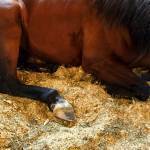Top Worries Following Surgery in Horses

Veterinary researchers from the United Kingdom recently reviewed data from 67 published studies to examine potential postoperative complications in horses.
“This study is important because knowing what complications may occur following surgery will allow owners to prepare themselves for prolonged hospitalizations, increased treatment costs, future effects on performance, or potentially euthanasia,” explained Catherine Whitehouse, M.S., a nutrition advisor for Kentucky Equine Research.
Data for eight specific complications reported in those 67 studies published between 2000 and 2023 were analyzed. Those complications included:
- Postsurgical colic;
- Surgical site difficulties, such as incisional infections;
- Dysfunction of muscles or nerves, including weakness;
- Laminitis;
- Diarrhea or colitis;
- Fever;
- Thrombophlebitis or thrombosis, such as a clot or inflammation of a blood vessel, including the jugular vein where the intravenous catheter was placed; and
- Respiratory irregularities.
For horses undergoing elective surgeries (not due to colic), the overall prevalence of postoperative complications was 17%.
“Of note, the prevalence of complications increased to 56% following colic surgery,” Whitehouse said.
Of the eight listed complications, postoperative colic occurred most. For elective procedures, the prevalence of postoperative colic was only 7%, but this increased to 26%—about one in four horses—when horses underwent general anesthesia for colic surgery,” Whitehouse explained.
All complications occurred more frequently in horses undergoing colic surgery than elective procedures, except for myopathy/neuropathy, which occurred with equal frequency.
“This study did not delve into reasons why more postoperative complications occur in horses undergoing colic surgery. Identifying those reasons would certainly benefit horses undergoing emergency colic surgery to help improve outcomes and expedite recovery,” noted Whitehouse.
As we know, colic cannot always be avoided, but certain steps can be taken to minimize the chances of intestinal problems. Renowned equine surgeon Anthony Blikslager, D.V.M., Ph.D., published his thoughts on colic prevention, highlighting that feeding large meals should be avoided.**
He wrote, “Meal feeding creates large changes in water movement in and out of the colon and alters the microbiome. These conditions may in turn result in colic conditions such as large colon impaction or large colon volvulus.”
“Instead of feeding large meals, offer horses multiple, smaller meals throughout the day, particularly when feeding energy-dense feeds. Whenever possible offer free-choice access to forage, using slow feeders as needed, and follow a regular feed routine. In addition to feed, don’t overlook water quality and intake to support digestive health and function, always making sure clean, fresh water is available,” advised Whitehouse.
To support the horse’s microbiome and overall intestinal health, consider EquiShure. This time-released hindgut buffer helps balance the pH of the hindgut by supplying sodium bicarbonate to neutralize excess acid detrimental to hindgut health.
*Loomes, K., J. de Grauw, M. Gozalo-Marcilla, J.I. Redondo, and R. Bettschart-Wolfensberger. 2024. A systematic review of the prevalence of post-operative complications after general anaesthesia in adult horses (2000-2023). Equine Veterinary Journal:14416.
**Blikslager, A.T. 2019. Colic prevention to avoid colic surgery: A surgeon’s perspective. Journal of Equine Veterinary Science 76:1-5.








